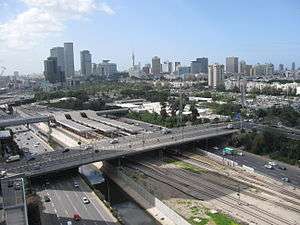Israel Railways
|
| |
|
Aerial view of Tel Aviv Savidor Central Railway Station, the location of the Israel Railways head office. | |
| state owned | |
| Traded as | TASE: RAIL.B2 |
| Industry | Railways |
| Headquarters | Tel Aviv Savidor Central Railway Station, Tel Aviv, Israel |
Area served | Israel |
Key people |
Shahar Ayalon (CEO) Benny Lavi (interim CEO) |
| Services | Rail transport, Cargo transport |
| Revenue |
|
|
| |
|
| |
| Owner | Government of Israel |
Number of employees | 1,900 (2015) |
| Website |
www |
 | |
 | |
| Locale |
|
|---|---|
| Dates of operation | 1948–present |
| Track gauge | 1,435 mm (4 ft 8 1⁄2 in) |
| Electrification | No |
| Length | 1,138 km |
| Website |
www |
Israel Railways corporation Ltd., dba Israel Railways (Hebrew: רַכֶּבֶת יִשְׂרָאֵל, Rakevet Yisra'el, Arabic: خطوط السكك الحديدية الإسرائيلية) is the state-owned principal railway company responsible for all inter-city, commuter, and freight rail transport in Israel. All its lines are standard gauge. The network is centered in Israel's densely populated coastal plain, from which lines radiate out in many directions.
Unlike road vehicles and city trams, Israeli railway trains run on the left hand tracks, matching neighboring Egypt and other Middle Eastern countries, whose formerly connected rail networks were constructed by British engineers. The head office is located at the Tel Aviv Savidor Central Railway Station in Tel Aviv.[4]
Until 1980 the head office was located at the Haifa Central Station. Tzvi Tzafriri, the general manager of Israel Railways, decided to move the head office to Tel Aviv Savidor. In May 2009 Yediot Aharonot said that Israel Railways was planning to move the head office to Lod. In response the company said this was necessary to centralize the various offices around Israel, to use a more central location in the country and to have more inexpensive land.[5]
Stations
There are more than sixty-four stations on the Israel railways network, with almost all of the stations equipped with accessibility help for disabled, audio system, vending machines and parking.
Bicycle policy
Bicycles are permitted on board the train in designated coaches from Sunday to Thursday between 09:00-15:00 and 19:00-06:00. On Fridays bicycles are permitted at all hours while on Saturdays bicycles are not permitted at any time.
Folding bicycles are allowed onto the train during all hours of operation, without a dedicated carrying case. The bicycle is required to be folded prior to entering the premises of the station. Tricycles are illegal at all times.[6]
Smoking
In Israel, smoking is prohibited in public enclosed places or commercial areas via several laws: particularly, since 1983, the "Israel Clean Air Act" (חוק אוויר נקי לישראל (in Hebrew)).[7] The law was amended in 2007 so that owners are held accountable for smoking in premises under their responsibility. The second means by which smoking is regulated in Israel is via the environmental hazard law,[8] and via criminal law smoking (or the introduction of second-hand smoke) may even be considered an assault.[9][10] All though smoking in railway stations is allowed at designated zones of the station, the sale of tobacco from automated vending machines is prohibited.
List of Stations
| Station | City/Airport | District |
|---|---|---|
| Nahariya | Nahariya | Northern District |
| Akko (Acre) | Acre | |
| Beit She'an | Beit She'an | |
| Migdal HaEmek/Kfar Baruch | Kfar Baruch | |
| Yokneam/Kfar Yehoshua | Kfar Yehoshua | |
| Kiryat Motzkin | Kiryat Motzkin | Haifa District |
| Kiryat Haim | Haifa | |
| Hutzot HaMifratz | Haifa | |
| Lev HaMifratz | Haifa | |
| Haifa Center HaShmona | Haifa | |
| Haifa Bat Galim | Haifa | |
| Haifa Hof HaCarmel | Haifa | |
| Atlit | Atlit | |
| Binyamina | Binyamina-Giv'at Ada | |
| Caesarea-Pardes Hanna | Pardes Hanna-Karkur + Caesarea | |
| Hadera Ma'arav | Hadera | |
| Netanya | Netanya | Central District |
| Netanya Sapir | Netanya | |
| Beit Yehoshua | Beit Yehoshua | |
| Hod Hasharon Sokolov | Hod HaSharon | |
| Kfar Saba – Nordau | Kfar Saba | |
| Rosh HaAyin North | Rosh HaAyin | |
| Petah Tikva Sgula | Petah Tikva | |
| Petah Tikva Kiryat Aryeh | Petah Tikva | |
| Bnei Brak | Bnei Brak | Tel Aviv District |
| Herzliya | Herzliya | |
| Tel Aviv University | Tel Aviv | |
| Tel Aviv Savidor Central | Tel Aviv | |
| Tel Aviv HaShalom | Tel Aviv | |
| Tel Aviv HaHagana | Tel Aviv | |
| Ben Gurion Airport | Ben Gurion Airport | Central District |
| Paatei Modi'in | Modi'in-Maccabim-Re'ut | |
| Modi'in Central | Modi'in-Maccabim-Re'ut | |
| Ramla | Ramla | |
| Beit Shemesh | Beit Shemesh | Jerusalem District |
| Biblical Zoo | Jerusalem | |
| Jerusalem Malha | Jerusalem | |
| Holon Junction | Holon | Tel Aviv District |
| Holon-Wolfson | Holon | |
| Bat Yam-Yoseftal | Bat Yam | |
| Bat Yam-Komemiyut | Bat Yam | |
| Rishon LeZion Moshe Dayan | Rishon LeZion | Central District |
| Rishon LeZion HaRishonim | Rishon LeZion | |
| Rehovot | Rehovot | |
| Yavne West | Yavne | |
| Yavne East | Yavne | |
| Ashdod Ad Halom | Ashdod | Southern District |
| Ashkelon | Ashkelon | |
| Sderot | Sderot | |
| Netivot | Netivot | |
| Ofakim | Ofakim | |
| Kiryat Gat | Kiryat Gat | |
| Lehavim-Rahat | Lehavim + Rahat | |
| Beersheba North | Beersheba | |
| Beersheba Center | Beersheba | |
| Dimona | Dimona | |
Lines
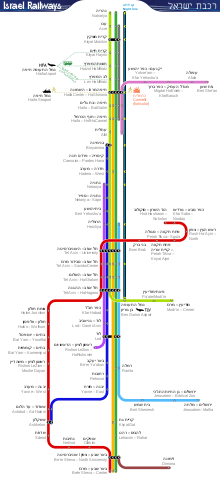

Israel Railways' passenger routes are divided into nine operational lines and three lines under construction:
| Line | Terminus (start) | Intermediate stations | Terminus (end) |
|---|---|---|---|
| Nahariya–Ashkelon | Nahariya | Akko – Kiryat Motzkin – Kiryat Haim – Hutzot HaMifratz – Lev HaMifratz – Haifa Center – Haifa Bat Galim – Haifa Hof HaCarmel – Atlit – Binyamina – Caesarea-Pardes Hanna – Hadera West – Netanya – Beit Yehoshua – Herzliya – Tel Aviv University – Tel Aviv Center – Tel Aviv HaShalom – Tel Aviv HaHagana – Holon Junction – Holon Wolfson – Bat Yam Yoseftal – Bat Yam Komemiyut – Rishon LeZion Moshe Dayan – Yavne West – Ashdod Ad Halom | Ashkelon |
| Tel Aviv–Hod HaSharon | Tel Aviv University | Bnei Brak – Petah Tikva Kiryat Aryeh – Petah Tikva Sgula – Rosh HaAyin North – Kfar Saba – Nordau | Hod HaSharon Sokolov |
| Tel Aviv–Lod | Tel Aviv HaHagana | Kfar Chabad – Lod Ganei Aviv – Lod | Rishon LeZion HaRishonim |
| Tel Aviv–Modi'in | Tel Aviv HaHagana | Ben Gurion Airport – Pa'atei Modi'in | Modi'in Center |
| Lod–Ashkelon | Lod | Be'er Ya'akov – Rehovot – Yavne East – Ashdod Ad Halom | Ashkelon |
| Lod–Be'er Sheva | Lod | Ramla – Kiryat Gat – Lehavim-Rahat – Be'er Sheva North | Be'er Sheva Center |
| Lod–Jerusalem | Lod | Ramla – Beit Shemesh – Biblical Zoo | Jerusalem Malha |
| Tel Aviv–Jerusalem | Tel Aviv HaHagana | Ben Gurion Airport | Jerusalem Binyanei HaUma |
| Ashkelon–Be'er Sheva | Ashkelon | Sderot – Netivot – Ofakim | Be'er Sheva North |
| Akko–Karmiel | Akko | Ahihud | Karmiel |
| Be'er Sheva–Eilat | Be'er Sheva North | Be'er Sheva Center – Dimona – Hatzeva – Sapir – Paran – Yahel – Yotvata – Ramon Airport – Shchoret – Eilat | Eilat Port |
| Haifa–Beit She'an | Haifa Center | Kfar Yehoshua – Yokne'am – Migdal HaEmek – Kfar Baruch – Afula | Beit She'an |
Future
The flagship project of Israel Railways is the construction of an improved rail line from Tel Aviv to Jerusalem. The line will begin as an extension of the current railway to Ben Gurion Airport and Modi'in, and will terminate in a new underground station beside the Jerusalem Central Bus Station. An additional proposal would connect Modi'in to Jerusalem by connecting to the aforementioned line.[11]
A 23.5 kilometres (14.6 mi) line from the city of Acre, on the Mediterranean coast, to Karmiel is under construction as of 2015; it is planned to be extended north to the north-eastern town of Qiryat Shemona, though there is no timetable for construction. This line will be fully electrified.[12]
In 2011 the reconstruction and expansion of the 60 kilometres (37 mi) long, formerly abandoned Jezreel Valley railway line connecting Haifa and Beit Shean (near the Jordanian border) started. This was completed in 2016. There has been talk of further extending the line to Irbid, in Jordan (to allow a direct freight connection from Jordan to the Mediterranean Sea), however no decision has yet been made on this matter. Another proposed extension under discussion would connect the reconstructed Jezreel Valley railway at Afula to Tiberias.[13]
Rolling stock
Current
Locomotives
| Class | Image | Type | Top speed | Number | Remarks | Built | |
|---|---|---|---|---|---|---|---|
| mph | km/h | ||||||
| EMD G12 | DE locomotive | 27 | Bo-Bo.[14] Israel imported 23 from EMD 1954–62 and captured four more from Egyptian National Railways in the 1967 Six-Day War. Some have been withdrawn and one (107) is now in the Israel Railway Museum in Haifa.[15] 106 withdrawn after sabotage. 119 & 123 withdrawn after incidents. 130 never in service due to Six-Day War. | 1954–62 | |||
| EMD G26 |  |
DE locomotive | 12 | [16] | 1971–82 | ||
| T44 |  |
DE locomotive | 60 | 100 | 1 | [17] EMD prime mover. | 1989? |
| EMD GT26CW-2 |  |
DE locomotive | 7 | Number 701 is an original EMD unit delivered in 1989. 710-716 are NRE NGT26 variants which are completely rebuilt, like-new locomotives delivered starting in August 2015. | 1989 | ||
| Alstom Prima JT 42CW |  |
DE locomotive | 68 | 110 | 8 | Series 702-709. EMD prime mover. | 1996 |
| Alstom Prima JT 42BW | DE locomotive | 87 | 140 | 48 | Series 731-778. EMD prime mover. | 1996–2006 | |
| GA DE900 locomotives | 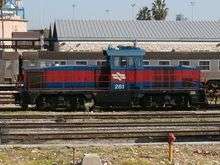 |
DE locomotive | 50 | 80 | 3 | Series 261-263. Nowadays used only for shunting. Only non-EMD powered diesel locomotives in IR's fleet. | 1997 |
| Vossloh Euro 3200 | DE locomotive | 100 | 160 | 24 | Series 1301–1324. With modifications capable of 200 km/h. EMD prime mover. | 2011–13 | |
| Vossloh Euro 4000 | DE locomotive | 80 | 130 | 14 | Series 1401–1414. EMD prime mover. | 2011 | |
| Bombardier TRAXX AC | Electric locomotive | 100 | 160 | 62 (32 options)[12] | Ordered in 2015[12] | ||
Multiple Units
| Class | Image | Top speed | Number | Remarks | Built | |
|---|---|---|---|---|---|---|
| mph | km/h | |||||
| ABB Scandia IC3 |  |
112[18] | 180[18] | 9 (42-50) | DMU's. The introduction of IC3-trains in the early 1990s marked the beginning of a political recommitment to major improvements in the services of Israel Railways. 42-50 purchased from SJ in 2005. 31 was scrapped after an incident near Revadim on August 10, 2006.[19] 19, 21, 25 possibly out of service. | 1990 |
 |
100[18] | 160[18] | 10 (01-10) | 1992 | ||
| 31 (11-41) | 1994–96 | |||||
| EMU | 100 | 160 | ~60 | Tender published in May 2016. Includes two basic double-deck sets: short (composed of 4 units) and long (6 units). | 2019 | |
Carriages
| Class | Image | Type | Top speed | Number | Remarks | Built | |
|---|---|---|---|---|---|---|---|
| mph | km/h | ||||||
| Alstom |  |
single deck push-pull | 100 | 160 | 37 | Assembled in Israel by Haargaz. 5 generator/driving coaches, 32 carriages.[20] | 1996 |
| Bombardier |  |
double deck push-pull[21] | 87 | 140 (to be retro-fitted to 160) | 24 | Driving- and generator trailer (PC-103) series 401-424. Two trailers out of operation[22] | 2001–04 |
| 68 | Coaches (TC-101) series 425-490. Four trailers out of operation[22] | 2001–04 | |||||
| 7 | Driving- and generator trailer (PC-103) series 501-507.[22] | 2005–06 | |||||
| 18 | Coaches (TC-101) series 521-538.[22] | 2005–06 | |||||
| 82 | Coaches (TC-101) series 2201–2394.[22] | 2005–06 | |||||
| Siemens Viaggio Light | 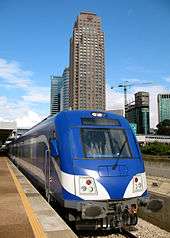 |
single deck push-pull[23][24] | 100 | 160 | 87 | Three types: standard coach (901-953[25] ), standard coach with wheelchair accessible toilets (825-849[25]) and DVT with diesel generator (801-810[25]).[26] First stock in service on March 8, 2009[27] | 2008 |
| single deck push-pull[28] | 31 | 2011 | |||||
| Bombardier |  |
double deck push-pull[29] | 87/100 | 140/160 | 78 | Further coaches were ordered from Bombardier in 2012 and delivered in 2014. | 2011 |
| Bombardier | double deck push-pull[30] | 100 | 160 | 72 | Ordered in 2012 and delivered from the end of March 2014. Instead of already delivered double deck stock capable of higher speeds and advanced safety measures. First rolling stock capable of operating on the future 25 kV 50 Hz High-speed railway to Jerusalem. | 2014 | |
| Bombardier | double deck push-pull | 100 | 160 | 60 | Ordered in 2016. | 2018 | |
Retired
| Class | Image | Type | Top speed | Number | Remarks | Built | |
|---|---|---|---|---|---|---|---|
| mph | km/h | ||||||
| Baldwin H class |  |
Steam locomotive | 6 | Series 7-12 (H2), 13-17 (H3), 33 of series 871-920. Taken over from Palestine Railways. Last went out of service in 1959 and scrapped in '60. | 1918 | ||
| NBL/Borsig Egyptian 545 class | Steam locomotive | 4 | 5 captured during 1956 Israeli invasion of Sinai on the former Palestine Railways main line between El Kantara East and Gaza: numbers 546, 550 and 557 (NBL) and numbers 607 and 613 (Borsig). 4 taken into stock and used them around Lod in central Israel for 1–2 years. Withdrawn and scrapped in 1959. | 1928, 1931 | |||
| NBL P class 4-6-0 |  |
Steam locomotive | 6 | Series 60-65. Taken over from Palestine Railways. Last went out of service in 1959 and scrapped in '60. Tender of 62 preserved in Railway Museum. | 1935 | ||
| LMS Stanier Class 8F |  |
Steam locomotive | 23 | Series around 70513. Taken over from Palestine Railways. Last went out of service in 1958. One (the 24th) stranded 8F, 70372 (NBL works no. 24680), on a small section of the main line near Tulkarm on the West Bank side of the 1949 Armistice line.It remained there, increasingly derelict, until after the 1967 Israeli 6 day war. The Israelis finally removed and scrapped it in about 1973. A similar 8F of TCDD 70414 preserved at Be'er Sheva Turkish Railway Station | 1935–46 | ||
| USATC S100 Class | Steam locomotive | 2 | Number 21 &22 (class 957?). Transported from Europe to Suez in September 1942. To Palestine Railways, later Army. Later to Israel Railways.[31] 1 | 1942 | |||
| SAFB (GM-EMD) | DE locomotive | 68 | 110 | 3 | BoBo. In service until 1998.[20] First diesel locomotive in IR's service | 1951–52 | |
| Esslingen | 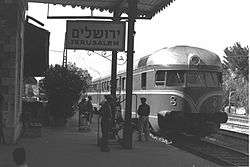 |
DMU | 12 | Similar to German VT08. 3-car sets (powered coaches 1-12, intermediate coaches 1-12, driving coaches 1-12), some later extended to 4-unit sets (with intermediate coaches 13-22).[32] In the early sixties converted to non-powered coaches in push-pull service because of high maintenance costs. Withdrawn in 1979. Some carriages continued in regular services from 1992 until nineties as 111-117.[20] One trailer should be preserved by the Country Museum in Tel Aviv | 1956 | ||
| Esslingen |  |
DE locomotive | 18 | Series 211-229. Similar to DB Class V 60. In the mid-1960s, the Esslingen factory was closed. As a result, some almost-new locomotives were cannibalised for parts.[33] One example preserved at the Railway Museum and another at the Jezreel Valley railway heritage site in Elro'i. | 1955–56 | ||
| EMD G16 | DE locomotive | 3 | Co-Co. During the Six-Day War Israel captured Egyptian Railways 3304, 3329 and 3361 which were appropriated into Israel Railways stock as numbers 301-303, later 161–163.[34] All have now been withdrawn from service but 163 (formerly ER 3361) is preserved at the Israel Railway Museum. | 1960–61 | |||
| O&K | carriages | 8 | 3rd class coaches similar to German Eilzugwagen. Seating however different with 2+3 seat arrangement and 96 seats.[35] | 1955 | |||
| Carel et Fouché CarF |  |
carriages | 14 | Picture: first carriage. Series 71-84 | 1961 | ||
| Boris Kidrič/Metalka "Yugo" | carriages | 43 | Series 601-643. 610 converted to half passenger carriage, half generator car. Some other were converted to full generator carriages.[36][37] 621 in 2009 used as office in red colors in Bnei Brak.[38] | 1964–72 | |||
| DEV-Inox Carel et Fouché |  |
carriages | 8 | Bought from SNCF in 1994 (Series 91-98). Original 1st class A9TJ-mainline carriage U64. Declassified to B10 1/2TJ in eighties. Scrapped in 2006.[39] 1 preserved in Railway Museum. | 1965 | ||
| British Railways Mark 2 TSO | carriages | 8 or 12 | Bought from British Railways in 1977 (Series 681-688). 1 preserved in Railway Museum.[20][40] | 1970 | |||
| FIAT 7225 | Railcar | 80 | 128 | 0 | 10 ordered. After 8 were finished, the order was cancelled for unclear reasons. Italian literature wrote because of the Yom Kippur War. All ten units were sold to Ferrocarril del Pacifico and Ferrocarril Chihuahua al Pacífico in Mexico,[41][42] where they entered service in 1975.[43] | 1970/1973[43] | |
Performance
| 1950 | 1960 | 1970 | 1980 | 1990 | 1991[44] | 1995 | 1996 | 1997 | 1998 | 1999 | 2000 | 2001 | 2002 | 2003 | 2004[45] | 2005 | 2006 | 2007 | 2008 | 2009 | 2010 | 2011 | 2012 | 2013 | 2014 | 2015 | |
|---|---|---|---|---|---|---|---|---|---|---|---|---|---|---|---|---|---|---|---|---|---|---|---|---|---|---|---|
| Passengers (million) | 1.6[46] | 4.4 | 4.1 | 3.3 | 2.5 | 2.9 | 4.8 | 5.1 | 5.6 | 6.4 | 8.8 | 12.7 | 15.1 | 17.5 | 19.8 | 22.9 | 26.8 | 28.4 | 31.8 | 35.1 | 35.9 | 35.9 | 35.9 | 40.4 | 45[47] | 48.5[48] | 53[49] |
| Revenue (passenger) (million NIS)[50] | 53 | 86 | 250 | 644 | 636 | 617 | 683 | 713[1] | 775[1] | ||||||||||||||||||
| Revenue (freight) (million NIS)[50] | 180 | 212 | 213 | 112 | 147 | 148 | 136 | 165[1] | |||||||||||||||||||
| Total Revenue (million NIS) | 324 | 393 | 574 | 814 | 840 | 813 | 866 | ||||||||||||||||||||
| Passenger-kilometres | 170 | 267 | 781 | 2,011 | 1,986 | 1,927 | 2,133 | ||||||||||||||||||||
| Train-kilometres (passenger)[50] | 3.812 | 9.375 | 8.905 | 8.767 | 8.348 | ||||||||||||||||||||||
| Ton-kilometres (cargo)[50] | 1,498 | 1,571 | 1,609 | 1,508 | 1,556 | ||||||||||||||||||||||
| Network length (km)[50] | 940 | 858 | 926 | 1,001 | 1,035 | 1,079 | 1,138 |
Notable accidents
- On December 26, 1963 two passenger trains on the then single-track main line linking Tel Aviv and Haifa collided head-on at Bet Yehoshua just south of Netanya.[51] The northbound train had passed a red signal and its locomotive rode over and crushed the locomotive of the southbound train.[52] None of the coaches was derailed but a coupler broke in the northbound train detaching the rear three coaches.[53] The continuous train brake should have then automatically stopped the detached coaches but it had not been connected properly so they started to roll back southwards.[53] 55 people were injured but only three seriously enough to be detained in hospital.[53] The two head-end crews survived but their locomotives, EMD G12s 105 and 118, were destroyed.[53]
- HaBonim disaster: On June 11, 1985 a train collided with a bus carrying school children, killing 19 children and 3 adults, near moshav HaBonim.[54]
- On June 21, 2005 an IC3 train crashed into a freight truck near kibbutz Revadim, killing 8 and injuring 198.[55]
- July 8, 2005, a train collided with a truck between Kiryat Gat and Ahuzam, resulting the death of the train driver and 38 injuries.[56][57] On February 2012 a plea bargain had been set[58] for the Revadim crash.
- On June 12, 2006 a train crashed into a truck near Beit Yehoshua, killing 5 and injuring from 77 to over 80.[59][60]
- On December 27, 2009 a train crashed into a car near Kiryat Gat. The driver proceeded without regard to the train checkpoint on the road. The train struck his car and he was killed.[61]
- On August 5, 2010 a train crashed into a minibus near Kiryat Gat, killing 7 and injuring 6. The minibus was hit at 19:05 GMT+3 on Route 353, apparently as it tried to pass over a level crossing.[62][63]
- On December 28, 2010 a fire started in a train near kibbutz Yakum, probably because of a short circuit, injuring 116.[64]
- On April 7, 2011 two trains collided frontally near Netanya, injuring 59.[65]
- On October 4, 2013, two men walking along railroad tracks in the Emek Hefer valley industrial zone were killed by a train.[66]
- On December 18, 2013, a Beersheba-bound train collided with a group of camels walking along railroad tracks at the Segev Shalom Junction in the Negev, killing 14 camels. The incident caused massive delays in train traffic.[67]
- On December 29, 2013, an Israel Railways worker was run down and killed by a train near Lod.[68]
- On March 15, 2016, an Israel Railways locomotive crashed into freight wagons, injuring 6.[69]
See also
Bibliography
- Cotterell, Paul (1986). The Railways of Palestine and Israel. Tourret Publishing. ISBN 0-905878-04-3.
References
- 1 2 3 4 Jeremaya Goldberg: Israel reports 9% passenger increase in International Railway Journal, 2016-03-30, retrieved 2016-04-04
- ↑ "Israel Railways – About Israel Railways".
- ↑ "רכבת ישראל - הודעות דוברות - 2015–2016".
- ↑ "Application Form for Compensation/Refund for Delay." (Archive) Israel Railways. Retrieved on 9 April 2013. "Tel Aviv Central-Savidor Station, POB. 18085, Tel Aviv 61180"
- ↑ "From press release of May." (Press Release May 2009) (Archive) Israel Railways. Retrieved on 9 April 2013.
- ↑ "Israel Railways – Bicycle policy".
- ↑ "Law for the restriction of smoking in public places". (in Hebrew). Retrieved 21 November 2007.
- ↑ (in Hebrew)
- ↑ צור, כרמל בן (3 September 2007). "בימ"ש: עישון במסעדה הוא תקיפה ועילה לפיטורים". Retrieved 26 June 2016 – via Haaretz.
- ↑ the criminal act law defines smoking as an assault (in Hebrew)
- ↑ "Israel Railways to build Modi'in-Jerusalem rail link". Globes. 6 July 2016. Retrieved 12 August 2016.
- 1 2 3 "Israel starts mainline electrification, orders Bombardier electric locomotives". Trains Magazine. 28 August 2015. Retrieved 29 August 2015.
- ↑ "New train from Tiberias to Tel Aviv in 1 hour". Ynetnews. 22 July 2016. Retrieved 12 August 2016.
- ↑ Cotterell, 1984, page 136
- ↑ "Gallery". Fun. Israel Railways. Retrieved 2011-05-25.
- ↑ Cotterell, 1984, page 137
- ↑ HaRakevet: Rothschild PhD, Rabbi Walter (juni 1990), Swedish State Railways Class T44. Issue 8
- 1 2 3 4 "Israel". railfaneurope.net.
- ↑ HaRakevet: Rothschild PhD, Rabbi Walter (juni 2009), Rolling stock news: IC3 set condemned. Series 19:4 issue 75
- 1 2 3 4 "Israel Railways Modern Passenger Trains – English". angelfire.com.
- ↑ "ISR orders more double-deckers". Railway Gazette. Retrieved 2010-10-12.
- 1 2 3 4 5 Tender Israel Railwaays 2013
- ↑ "Viaggio". Siemens. Retrieved 2011-02-20.
- ↑ "Siemens Israel / Mobility in Israel". Siemens.
- 1 2 3 HaRakevet: Rothschild PhD, Rabbi Walter (juni 2009), Siemens Coach number. Series 22:1 issue 84
- ↑ HaRakevet: Rothschild PhD, Rabbi Walter (September 2009), XXI Siemens Coaches in operation. Inititial impressions. Series 22:3 issue 86
- ↑ HaRakevet: Rothschild PhD, Rabbi Walter (juni 2009), Siemens stock into service. Series 22:2 issue 85
- ↑ "Israel Railways orders second batch of Siemens coaches". railwaygazette.com. Retrieved 2014-06-12.
- ↑ "ISR orders more double-deckers". Railway Gazette. Retrieved 2014-06-12.
- ↑ "First electrification-ready stock delivered to Israel Railways.". Railway Gazette. Retrieved 2014-04-01.
- ↑ HaRakevet: Rothschild PhD, Rabbi Walter (September 1992), WD/USA 0-6-0Ts in Palestina, 1942–46. Issue 18
- ↑ HaRakevet: Rothschild PhD, Rabbi Walter (July 1990). Issue 9
- ↑ HaRakevet: Rothschild PhD, Rabbi Walter (June 1992), The Esslingen shunters. Issue 17
- ↑ Cotterell, Paul (1984). The Railways of Palestine and Israel. Abingdon: Tourret Publishing. p. 103. ISBN 0-905878-04-3. External link in
|publisher=(help) - ↑ HaRakevet: Rothschild PhD, Rabbi Walter (December 2009), 3rd. Class Passenger Coaches for the Israeli State Railways. Series 22:4 issue 87
- ↑ "Israel Railways Passenger Trains – Details on Short Iron Carriage Types" (in Hebrew). Archived from the original on October 9, 2007. Retrieved 2008-02-15.
- ↑ "General Information – Types of Rolling Stock in Use" (in Hebrew). Israel Railways. Archived from the original on 2007-10-28. Retrieved 2008-02-15.
- ↑ HaRakevet: Rothschild PhD, Rabbi Walter (September 2009), News. Series 22:3 issue 86
- ↑ HaRakevet: Rothschild PhD, Rabbi Walter (juni 2009), Rolling stock news: End of French coaches. Series 19:4 issue 75
- ↑ "Picture Gallery". railfaneurope.net.
- ↑ HaRakevet: Rothschild, Rabbi Walter (12-2007), A Quarterly Journal of the Railways of the Middle East
- ↑ "SJK Postvagnen". postvagnen.com.
- 1 2 HaRakevet: Rothschild PhD, Rabbi Walter (December 2007), The mysterious Fiat railcars. Series 20:4 issue 79
- ↑ HaRakevet: Rothschild PhD, Rabbi Walter (April 1992), A Record Year. Issue 16
- ↑ http://www.rail.co.il/HE/About/Pages/statistics.aspx
- ↑ "������ �������". replacement character in
|title=at position 1 (help) - ↑ "More Israelis travelling by train – Globes English".
- ↑ "Israel Railways passenger traffic up 7.5% in 2014 – Globes English".
- ↑ Kevin Smith: “Cultural changes” spark turnaround at Israel Railways in: International Railway Journal, 2016-03-14, retrieved 2016-04-04.
- 1 2 3 4 5 "CBS, STATISTICAL ABSTRACT OF ISRAEL 2013 ISRAEL RAILWAY SERVICES" (PDF). cbs.gov.il.
- ↑ Cotterell, 1984, page 101
- ↑ Cotterell, 1984, pages 101–102
- 1 2 3 4 Cotterell, 1984, page 102
- ↑ "The Pittsburgh Press – Google News Archive Search".
- ↑ Tova Dadon (2005-06-25). "Israeli train crash". Ynetnews. Retrieved 2007-10-03.
- ↑ Tomer Zarchin (19 March 2009), "Israel Railways, executives charged in fatal crashes", haaretz.com
- ↑ Tova Dadon (19 March 2009), "Train, truck collide in south", ynet.co.il
- ↑ "הסדר טיעון: רכבת ישראל הורשעה בגרימת מוות ברשלנות בשל התאונה ברבדים".
- ↑ Ra'anan Ben-Tzur, Oren Rice (2006-06-12). "Train accident in the Sharon region – 5 dead, dozens wounded" (in Hebrew). Ynet. Retrieved 2007-10-03.
- ↑ Roni Singer-Heruti (2007-03-22). "Police: Try Israel Railways head for negligence over fatal crash". Haaretz. Retrieved 2007-10-03.
- ↑ Sagi Bashan (2009-12-27). "One killed in crash between train and car; Trains traffic disruptions in southern Israel" (in Hebrew). Reshet.
- ↑ "Seven die in southern Israel as train hits minibus". BBC. 2010-08-04.
- ↑ Tova Dadon (2010-08-05). "7 killed in crash between train and minibus in southern Israel" (in Hebrew). Ynet.
- ↑ Raanan Ben Zur and Aviel Magensi (2010-12-28). "Fire started in a train from Haifa to Tel Aviv, 116 injured" (in Hebrew). Ynet.
- ↑ Raanan Ben Zur and Aviel Magensi (2011-04-07). "59 wounded in a frontal collision between two trains near Netanya" (in Hebrew). Ynet.
- ↑ "2 killed by passenger train in central Israel". Ynetnews. April 10, 2013.
- ↑ Mati Siver (2013-12-18). "14 camels killed by train in Negev". Ynetnews.
- ↑ "Israel Railways worker killed by passing train". Ynetnews. 2013-12-29.
- ↑ Channel 10 (Israel) (2016-03-15). [news.nana10.co.il/Article/?ArticleID=1180433 "6 injuring by train in Negev"] Check
|url=value (help). Nana10.
External links
![]() Media related to Israel Railways at Wikimedia Commons
Media related to Israel Railways at Wikimedia Commons
- Official website
- Official website (Hebrew)
- Official website (Arabic)
